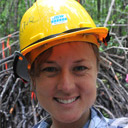
The Congo river is enormous, stretching almost to the murky horizon on both sides. Ollivier Girard/CIFOR
Félicien Kengoum and I are in a small motor boat in the middle of the Congo River. We’re returning from the remote village of Lukolela, heading downstream towards Kinshasa, the capital of the Democratic Republic of Congo (DRC).
We’re between nations here – on the east bank is the DRC, and on the west the Republic of Congo.
But we can barely see either of them – the river is enormous, stretching almost to the murky horizon on both sides.
We pass makeshift camps on remote islands, fishermen in dugout canoes rafts of logs floating slowly down to market, and a military container ship laden with armoured tanks.
As we approach the city, the banks narrow, and the wind starts roaring up the river from the south, whipping up chocolate-coloured waves and sending wild splashes through the boat’s broken windows.
But Félicien – a Centre for International Forestry Research (CIFOR) researcher normally based in the Central Africa regional office in Cameroon – tells me this is nothing, compared with the trip he took to get to Lukolela, two weeks before.
“We were told that the journey would last for one day and a half. We started the trip on Sunday, thinking we would arrive on Monday,” he says.
“But in the end we spent four days on the river, sleeping in the boat.”
As they travelled up the river taking on more passengers, the boat became severely overcrowded, and sat low in the river.
“It is not built for such trips, because there are no toilets, and the driver will not stop – so to relieve yourself is a real challenge.”
This was Félicien’s first major trip to the field as a CIFOR researcher. He travelled to Lukolela with CIFOR senior scientist Anne Marie Tiani, and a representative of the DRC Environment Ministry. They planned to conduct research and implement a COBAM project that aims to find synergies between climate change mitigation and adaptation.
The team slept for four nights on plastic chairs amongst sacks of food and the materials they had brought for the workshop.
But Félicien says the experience helped him to better understand everyday realities for people in that part of the DRC.
“From Kinshasa to Lukolela is 540 km, but there are boats that spend a month on that journey,” he tells me.
“On those boats it’s a whole life, you have people selling things, charging phones, selling credit, cooking food, they are doing everything. And when you see them passing, it is just like a moving world, a world totally apart.”
“For people in Lukolela, going to Kinshasa is always a challenge, because they cannot afford to pay US$120 for the speedboat.”
“For example, I’ve been told that a civil servant in the army, the lowest grade, earns about $40 per month, so that means it is costs three months’ salary to pay for just one single trip. So you can imagine they prefer the slow boat.”
The team eventually arrived and spent two weeks successfully conducting research and workshops with local people in the remote community. Félicien says this, too, was a learning experience.
“At times it is really challenging, because the people we are working with they have immediate problems that they want immediate solutions for.”
“It’s a very big challenge to have someone who is hungry, and have to tell him ‘no, that is not what we are here for…we are here to solve another problem of yours’.”
But he says such trips to the field are vital for scientists – despite the challenges in this part of the world.
“When you go in the field, you understand two things, you understand the context, and you understand the people and their culture,” he says.
“And that helps you to make necessary changes to a project, and to know about the challenges and constraints of the project’s implementation.
“That means for a researcher, going to the field should be a necessity. After this kind of experience, you are never the same.”
For more stories from the Congo Basin, click here.
We want you to share Forests News content, which is licensed under Creative Commons Attribution-NonCommercial-ShareAlike 4.0 International (CC BY-NC-SA 4.0). This means you are free to redistribute our material for non-commercial purposes. All we ask is that you give Forests News appropriate credit and link to the original Forests News content, indicate if changes were made, and distribute your contributions under the same Creative Commons license. You must notify Forests News if you repost, reprint or reuse our materials by contacting forestsnews@cifor-icraf.org.












